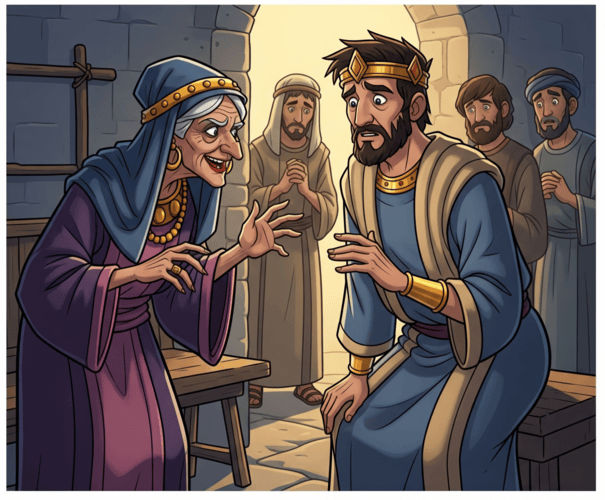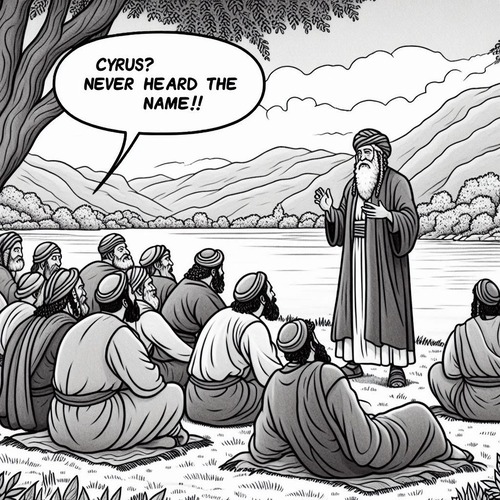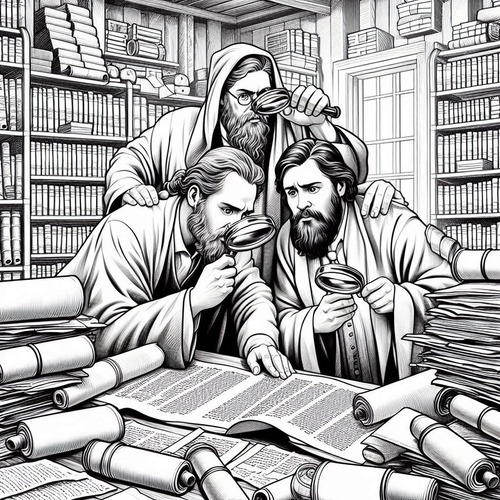Did the Witch of Endor Actually Raise Samuel from the Dead?
WHAT REALLY HAPPENED AT ENDOR? THREE REFORMED VIEWS
King Saul crouched in the shadows outside a small house in Endor, disguised and desperate. The Philistines were massing for battle, God had stopped answering his prayers, and Samuel—his spiritual mentor—was dead. In his darkest hour, Israel’s first king broke his own law and sought out a medium to contact the dead.
What happened next has puzzled Bible readers for centuries. Did the witch actually raise Samuel’s ghost? Was it a demonic trick? Or something else entirely? The story in 1 Samuel 28 gives us one of Scripture’s most mysterious supernatural encounters. And Reformed theologians have offered compelling answers that protect both God’s sovereignty and biblical truth.
THE FORBIDDEN CONSULTATION
The irony is thick in this passage. Saul had previously banished all mediums and spiritists from Israel in obedience to God’s law (1 Samuel 28:3). Leviticus 19:31 and Deuteronomy 18:10-12 explicitly forbid consulting the dead. Yet here was the king himself, disguised and desperate, begging a medium to “bring up Samuel.”
The woman initially refuses, fearing it’s a trap. But when Saul swears by the Lord that she won’t be punished, she agrees. The moment she begins her ritual, everything changes. She cries out in shock, immediately recognizing that this is no ordinary séance. Something—or someone—has actually appeared.
WHAT REALLY HAPPENED? THREE REFORMED VIEWS
1. God Sovereignly Raised Samuel’s Spirit. John Calvin, Matthew Henry, and many Puritan commentators believed God actually brought Samuel back to deliver one final message to Saul. Their reasoning is compelling:
The text consistently identifies the figure as “Samuel” himself, not an apparition or imposter. When Samuel speaks, his words carry the unmistakable authority of divine prophecy. He accurately predicts Saul’s death and Israel’s defeat, knowledge only God could possess.
Most tellingly, the medium herself is shocked by Samuel’s appearance. Her surprise suggests something extraordinary had happened—something beyond her usual tricks or demonic encounters. Just as God spoke through Balaam’s donkey and used pagan divination to accomplish His purposes, He could use even this forbidden practice to deliver His final word to Saul.
This view emphasises God’s absolute sovereignty over life and death. No power in heaven or earth can act outside His decree. If Samuel appeared, it was because God willed it, not because human necromancy actually works.
2. It Was a Demonic Deception: Some Reformed theologians argue the figure was actually a demon masquerading as Samuel. Scripture warns Satan can appear as an “angel of light” (2 Corinthians 11:14) and that deceiving spirits will perform signs and wonders (Matthew 24:24).
Since necromancy was explicitly forbidden and associated with demonic activity, they argue, God would never honour such practices with genuine supernatural intervention. The accuracy of the prophecy doesn’t guarantee divine origin—demons possess supernatural knowledge and can make accurate short-term predictions.
This interpretation serves as a stark warning against all forms of occult practice. It emphasises even seemingly successful supernatural encounters outside God’s revealed ways are spiritually dangerous deceptions.
3. It Was a Divine Vision or Prophetic Revelation: A third group of Reformed scholars suggests God gave Saul a vision of Samuel without actually raising the dead. In this view, the medium served as an unwitting instrument of divine revelation, much like the pagan prophets God sometimes used in the Old Testament.
This position preserves God’s sovereignty while avoiding any suggestion that necromancy itself was effective. It explains both the supernatural nature of the encounter and the accuracy of the prophecy while maintaining clear boundaries between the living and the dead.
WHAT THE TEXT ACTUALLY SAYS
Careful reading reveals several crucial details. Samuel appears wearing his familiar robe, and Saul immediately recognises him. Samuel’s first words express irritation at being “brought up” and disturbed from his rest. His prophecy is specific and devastating: “Tomorrow you and your sons will be with me, and the Lord will give the army of Israel into the hands of the Philistines.”
Notably, the text never says the medium’s power worked. It describes what happened without endorsing the practice. Scripture often records events without approving them—a crucial distinction for biblical interpretation.
REFORMED THEOLOGICAL PRINCIPLES
Regardless of which interpretation we prefer, several theological principles remain constant in Reformed thinking:
- God’s Sovereignty: Nothing happens outside God’s decree and permission. Whether Samuel actually appeared or God allowed a deceptive vision, the encounter served God’s purposes in delivering final judgment to Saul.
- The Intermediate State: Reformed theology teaches the dead exist consciously in God’s presence, awaiting the resurrection. They’re not wandering spirits accessible to human manipulation but souls under God’s direct care.
- Biblical Authority: We must distinguish between descriptive and prescriptive passages. The Bible describes the Endor encounter without endorsing necromancy, just as it describes David’s adultery without approving immorality.
THE WITCH OF ENDOR: THE CENTRAL LESSON
While Reformed interpreters disagree on the mechanism, they unite on the message. This passage serves as a sobering warning about spiritual compromise. When we abandon God’s revealed ways in desperate times, we open ourselves to deception and destruction.
Saul’s tragic end began not at Endor but years earlier when he chose partial obedience over full surrender to God’s will. The medium’s house was simply the final stop on a long journey away from the Lord.
The story reminds us God’s Word is sufficient for life and godliness. We don’t need supernatural signs or forbidden practices to know God’s will. His revealed truth in Scripture provides everything we need for faithful living.
THE WITCH OF ENDOR: RELATED FAQs
Why didn’t God just speak to Saul directly instead of using a medium? God had already withdrawn His communication from Saul due to repeated disobedience (1 Samuel 28:6). The use of a forbidden medium actually emphasises God’s judgement—Saul was reduced to seeking God through the very practices that contributed to his spiritual downfall. This ironic reversal highlights the severity of Saul’s rebellion and God’s determination to deliver His final word through unexpected means. The method itself becomes part of the message about Saul’s spiritual bankruptcy.
- If the dead can’t normally communicate with the living, why did this incident happen? Reformed theology maintains the dead are “absent from the body, present with the Lord” (2 Corinthians 5:8) and not wandering spirits. RC Sproul argued this was an extraordinary divine intervention, not a normal occurrence that validates necromancy. John Frame counters it was precisely because such communication is impossible that demonic deception was necessary to maintain the medium’s reputation. Walter Kaiser suggests it was a prophetic vision given to Saul, not actual communication with the dead.
- How do we know the medium wasn’t just a skilled fraud using psychological tricks? The medium’s genuine shock and fear when Samuel appeared indicates this wasn’t her normal routine of deception. Her immediate recognition that something supernatural had occurred suggests she was accustomed to fakery but encountered something genuinely beyond her experience. Additionally, the specific and accurate prophecy delivered couldn’t have been achieved through psychological manipulation or general fortune-telling techniques. The text presents this as a genuine supernatural encounter, not mere trickery.
What does this passage teach us about the intermediate state between death and resurrection? Samuel’s appearance suggests conscious existence after death, supporting Reformed teaching about the intermediate state. Derek Thomas notes Samuel retained his identity, memory, and prophetic calling even in death. However, Wayne Grudem warns against using this passage to establish doctrine about the afterlife since it describes an extraordinary, not normative, situation. The passage does indicate the dead are under God’s authority and not naturally accessible to human summoning.
- Did Samuel’s prophecy come true exactly as predicted? Yes, with remarkable precision. Samuel predicted that Saul and his sons would die the next day and that Israel would be defeated by the Philistines—both prophecies were fulfilled exactly (1 Samuel 31). This accuracy is used by proponents of the “actual Samuel” view to argue for divine origin, while supporters of the “demonic deception” view point out that demons can make accurate short-term predictions. Eugene Merrill suggests the accuracy validates God was behind the vision, regardless of whether Samuel literally appeared.
- Why would God allow His prophet to be “brought up” through a forbidden practice? John MacArthur argues God’s sovereignty means He can use even sinful human schemes to accomplish His purposes, just as He used the pagan king Nebuchadnezzar as His instrument. The forbidden nature of the practice actually enhances the judgment aspect—Saul’s rebellion was so complete that God’s final word came through the very means Saul should have rejected. Clinton Arnold counters that God would never validate occult practices by genuine supernatural intervention, making demonic deception more likely. Tremper Longman III sees this as God granting Saul a vision while maintaining the prohibition against necromancy.
What implications does this passage have for modern spiritual warfare and occult practices? All Reformed interpreters agree this passage provides no endorsement for attempting to contact the dead or engage in occult practices. Neil Anderson uses this passage to warn about demonic deception in modern séances and channelling. Sinclair Ferguson emphasises Christians have access to God through Christ and Scripture, making such practices both unnecessary and dangerous. Gordon Fee argues that the passage demonstrates God’s sufficiency in revelation—we don’t need to seek supernatural experiences beyond what God has already provided in His Word.
THE WITCH OF ENDOR: OUR RELATED POSTS
Editor’s Pick
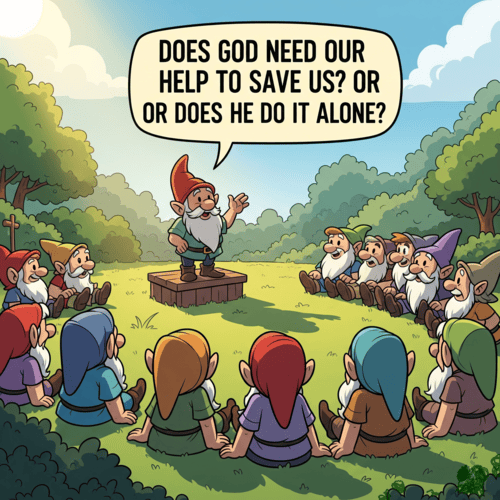
Monergism vs Synergism: Is Salvation God’s Work Alone?
When God saves us, does He do it alone, or does He need our help? The question isn’t mere theological [...]

Was Jesus Abandoned by the Father on the Cross?
WHY WE ANSWER IN THE NEGATIVE “My God, my God, why have you forsaken me?” These words from the cross [...]

Why Do Some Respond to God’s Call While Others Don’t?
THE REFORMED VIEW ON OUTWARD AND INWARD CALLS EXPLAINED Picture this: Two neighbours attend the same church service. They hear [...]

Does Ocean Salt Content Prove a Young Earth?
A COMPELLING LOOK AT MARINE CHEMISTRY AND EARTH’S TIMELINE The Salt Question That Challenges Deep Time: If Earth’s oceans have [...]
Noah’s Flood: Where Did All the Water Come From? And Go?
The question hits every Bible-believing Christian at some point: “If Noah’s flood covered the whole earth, where did all that [...]

No Marriage in Heaven? What Does Mark 12:25 Mean?
“Will I see my spouse in heaven? Will we still be married?” These questions pierce the heart of every Christian [...]
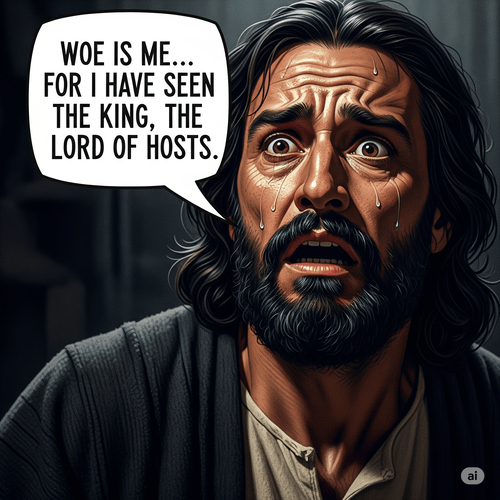
The Terror of Meeting God: What Isaiah 6 Reveals About Divine Holiness
WHEN ‘WOE IS ME’ IS THE ONLY PROPER RESPONSE TO A GLIMPSE OF GOD Picture this: You’re a prophet of [...]

Is the Holy Spirit Present in Unbelievers? The Biblical Answer
Can someone who doesn’t believe in Jesus Christ have the Holy Spirit living inside them? This question strikes at the [...]

The Gap Theory Exposed: Why Embrace a Young Earth?
The Gap Theory proposes there’s a vast time gap—millions or billions of years—between Genesis 1:1 (“In the beginning God created [...]

Rethinking Sickle Cell Anaemia: A Case for Intelligent Design
Sickle cell anaemia presents what many consider evolution’s strongest card—a genetic condition that causes suffering yet provides protection against malaria. [...]

